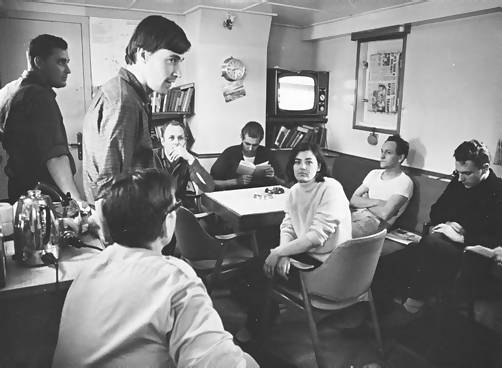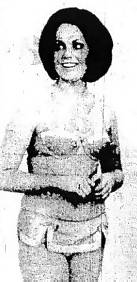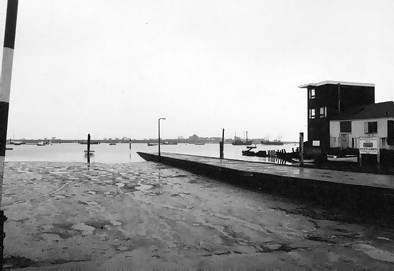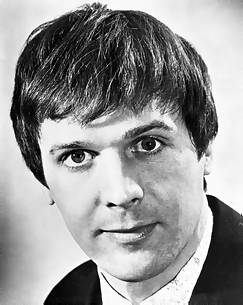Colin Nicol: Was Keith Martin there at that time?
Richard Harris: No, not at that time, was he? He didn't come 'til later on. That was the nucleus of the presenters or disc jockeys or whatever you like to call them and then of course the production
side was the amazing Ken Evans with - what was that lady he used to work with - Margaret, Maureen?
|

|
|
On board the mv Mi Amigo: Bryan Vaughan standing, engineer Toni Visscher at the back, Maureen Blackburn in the centre. Photo copyright
Agence de Presse Dalmas, Paris, kindly provided by Colin Nicol.
|
CN: Maureen Blackburn was an assistant, there was also Marion Cochrane.
RH: Marion was the first one, wasn't she? She was super. Another Australian lady, yeah. And then the knob twiddling was looked after by Dermot who eventually become a presenter to me, and the
amazing Harris, who wouldn't do anything unless he checked it out with his medium lady first. You remember, he was into spiritualism, he and his wife, and they had this lady who they used to approach before they
could make a decision. We irreverently called her ‘Madam Lazonga’. In fact, I think that some of us went to see her. I nearly did, Tony did - T.W. did, yes - and Madam Lazonga became quite a character.
I think Allan Crawford had a go at Madam Lazonga, as well.
CN: I know it was all the fashion..
RH: (Laughs) All the fashion, yes. Talk to Madam Lazonga - anyway ..
CN: We were all facing the great unknown at that point.
RH: Oh yes, that's right. The - let's see - next thing that happened of course, was, we heard, that the next thing of importance that happened, that we were all ready to go - two decisions
were made at that time. We at Atlanta thought that, in order to be more professional, we would record all our stuff on-shore because we were all practically new to the game at that stage at that time, weren't we? -
and send it out to the ship so that if we boo-booed or fluffed, we could re-record and when our programmes went out they would be as good as we could possibly make them as far as professionalism was concerned.
CN: Do you remember, we devised a system of timing so that the tapes would be synchronised with the time?
RH: Yes, I do. I remember that, very well. We had that amazing Japanese TEAC (tape) recorder, too, which was fantastic because, the work it did, and it never broke down - I think it only broke about
twice, that's all.
CN: Yes, that was one of the earliest of those, too.
RH: Yes. And Caroline, of course, as we subsequently found out, believed in putting poor old Simon out on the ship and broadcasting live from the ship. So, the next thing that happened was, that
we had got a whole lot of programme material put together which - oh! I know a name we've forgotten - Neil Spence who eventually became Dave Dennis, he was another presenter. Next thing
that happened, of course - Caroline went on the air and left poor old Allan with a bit of a red face. He never admitted, to me at any rate, that he'd made a boo-boo in having the Mi Amigo go into the O'Rahilly port
in Ireland, although deep down he must have known that it was a mistake to put it there and he should have listened to what I and others said to him, i.e, get it out. If necessary take it back to Spain, have the mast
put on and go on the air first. Anyway, that's now history and the mv Caroline went straight to where we were going to be - after, Allen had been assured, and in fact told me and Lesley Parish, that the way that Ronan
had approached the whole thing was, if we merge we can cover the whole of England because Caroline would go north and Atlanta would go south and then, we cover the whole lot. Of course, as it turned out, Caroline went
straight to where Atlanta was going to be anchored, off Frinton.
CN: There were some things Caroline didn't know about Radio Atlanta's operation, here and there though, weren't there? Did they get the frequency, did they get the mooring location? Did they
get those details?
RH: D'you know, I don't know, Colin.
CN: I don't believe they got the mooring location exactly right, and that was very crucial.
RH: Yes it was, yes that's right.
CN: I don't think they got that information. That's my recollection.
RH: That's why Sandy Horsley was, was - ah! you're absolutely right. He was our expert and was the expert, he got ours absolutely right but in fact Caroline's wasn't. You're so right.
CN: The frequencies I'm not sure about. I don't know whether they did get hold of our crystals - there was a lot of juggling at that point.
RH: They didn't, because I remember taking our crystals - no! No! We each had our own crystals, because don't you remember, there were those two Americans, father and son Bob Scott and the son was
..
CN: Bob Scott and Johnny Jackson
RH: Yeah, Bob Scott and Johnny Jackson. They were father and son. They went over to Ireland, once the Mi Amigo was sailing 'round to its eventual anchorage and to my horror and to Allan's horror,
started broadcasting while they were driving 'round. This was not at all the idea because we'd prepared a first day's programme schedule, if you remember, in which we were all introduced and what have you, and that
was supposed to be the first programme to go over the airwaves from Atlanta.
CN: And it had been arranged for them to accompany the ship around?
RH: Oh yes, that's right - just to have a look at it. But certainly not to broadcast from it.
CN: And they managed to convince the technicians to switch on?
RH: Yes, they did, and broadcast.
CN: Meanwhile, Caroline herself was broadcasting.
RH: Caroline was broadcasting, with poor, unfortunate Simon Dee, all on his tod. He was by himself wasn't he? There wasn't anyone else out there with him, I don't think.
CN: You know, I'm beginning to think that was the case - for twenty-four hours, or ..
RH: Longer!
CN: Yes, he did a two day stint or something, with no relief.
RH: No, no, I think he was out there for weeks - er, and not getting paid, either. Anyway, that was that. I suppose the next significant step - we went on the air if you remember - and I think
very well. I think our approach was very professional.
CN: Do you remember the date we switched on? I'm having a little trouble with that at the moment. I will find it. About how long after Caroline, do you think - a month, six weeks, less?
RH: It could be up to 6 weeks, I think. Could be about six weeks. But I know that our programmes were that much better, and this was brought about - because I still had - I mean, there was no
revenue coming in at all, to start with. We, both ships, had to live ‘off the hump’, what we'd got - because no one was advertising. From my connections with Independent Television, I still had tremendous
contact with people in advertising and they were all saying, “We're just listening to see which one we're going to put our money with”, and there's no doubt that we were winning hands-down. I had that on very
good authority from some of the big advertising agencies. It also got around to people like Jocelyn Stevens who were backing Caroline, that the agencies were much more favourably impressed towards Atlanta.
CN: He was at that time doing what?
RH: Who? Jocelyn Stevens? He was one of Caroline's biggest backers.
CN: But his business was, er ..
RH: Publishing.
CN: Yes, he was the owner or the editor of Queen Magazine?
RH: He was Harpers and Queen, wasn't he? Owner? I think he was the guv'ner. Anyway, Ronan's big shot, and he started getting a bit worried because Ronan was getting nowhere and he also got the
word, so I understand, that the agencies, the big (advertising) agencies were beginning to suggest to their clients, the Cadburys, Schweppes and people of this world - that they should put their money with Atlanta,
and it was then that he said to Ronan “look, you'd better do something about this or else”, and it was then that Ronan, so I understand, Col, came to Allan and said “look, this is crazy we are working
together we should combine, we should call the stations Caroline because we were on the air first and everyone associates with us, forget the name Atlanta” - and Allan agreed to all this and of course, once
he'd agreed to that, then Ronan said again, “I think we ought to make certain changes”. He was the one who said that the programme format should be changed, he tried to introduce Chris
Moore, who in those days knew nothing about programming, as his Programme Director, and Allan listened to him. The rest is history of course. Atlanta disappeared and Caroline took over and we had Caroline North
and Caroline South.
|

|
|
Was Radio Caroline named after her? Caroline Maudling at a 1964 charity fashion show. Cutting from the Daily Express, courtesy of Colin Nicol.
|
CN: Do you remember how Ronan came by the name Caroline? Did you hear the story at the time?
RH: Yes, I heard the story, you probably heard it as well. He was dating, so the word had it, (cabinet minister) Reggie Maudling's daughter who was called Caroline, and he named the station after her.
Did you hear that?
CN: Mm.
RH: Yeah. How true it is, of course, we shall never know.
CN: He said later of course that it was named after (President) Kennedy's daughter.
RH: (Laughs) Well, well, there we are then, it could be.
CN: Just some incidents now. The merger itself was quite a carve up of staff, and the move to Caroline House.
RH: Yes, well I'd left before that, because I'd virtually said to Allan, “Well if this is what you're gonna do, then I'm off.” I was courting Susie at the time, too. I didn't particularly
want to spend most of the time on board the ship because I used to get sea-sick, even in the bath! And so I in fact left before we moved to Caroline House. When I left, we were still in Dean Street. It was a very amicable
parting with Allan and I and, as you know, we are still in contact and still meet.
CN: Are there any incidents that come to mind, because you were, in those early days, from Brightlingsea, heavily involved in moving between Dean Street and the ship, and Brightlingsea, and getting us
aboard and getting us back, the logistics of the movements there.
RH: Yes - oh, it was incredible, as you remember, we were working, what, about eighteen hours a day regularly, weren't we? I remember one thing, I was taking a whole load of tapes down to Brightlingsea
from the studio. Remember, Allan had the mad Irishman make those huge great coffins with the tapes sort of slotted in, in order, so that all the Dutchmen had to do at the other end on board the Mi Amigo was to take them
out feed them into the transmitter and everything should work according to plan, and it did, in fact, it was remarkable how the programmes did go out on time and in the correct sequence. But I was going down once in the
car with a load of these coffins to go out to the ship and had the radio tuned into Radio Atlanta and it was near Chelmsford and a guy was hitch-hiking and I stopped and he got into the car and as it happened it was me
who was broadcasting at the time. And I was talking to him and he kept looking at the wireless and looking at me and he didn't say anything, in the end he couldn't stand it any longer, and he said, “That sounds like
you. Your voice is so like that bloke's on the wireless”. So I said, “It is”, and he said, “It can't be, you're here.” (Laughs) And I had great difficulty in persuading him that in fact it
was me. We used to get the tapes down to Brightlingsea and the only way we could get out to the ship - I think this must have been Allan who organised it - was in a dreadful old shingle barge. Did you ever go out on
it?
|

|
|
Brightlingsea, south of the harbour. Photo kindly provided by Colin Nicol.
|
CN: Oh - many times!
RH: (Laughs) Terrible thing!
CN: I've known it to take five hours to get out there.
RH: Yes - Oh, dreadful. With two old East Anglian crew members who used to sit there - in freezing cold always, wasn't it - drinking gallons of tea. With all the tapes mixed up in the shingle.
CN: Yes. There was no shelter.
RH: No, none at all. Terrible ..
CN: Was that a shingle barge or a sand barge, just as a point of ..
RH: I think it was shingle, wasn't it?
CN: I used to refer to them as sand barges but it's neither here nor there, they probably carried both.
RH: I think they did, yes (laughs). I always went out on the same one, did you go out on different ones?
CN: I don't know, never knew there was more than one, it was always the strange old man.
RH: Strange old man, yes, and his mate, yes. What else, what else?
CN: Incidents, really. Movements: Jacob' Hall, in Brightlingsea, movements to and from the ship, any things lost, people falling overboard ..
RH: No, I don't think so.
CN: Do you remember the story that Toni Visscher, the full-time resident chief engineer on the Mi Amigo, stayed all the time, without leaving the ship told, that he swore he was pushed off the ship
while it was in the Greenore area one day, pushed overboard?
RH: Oh that's right!
CN: Do you remember him saying that?
RH: Yes, yes. Yes, he told me that. I forgot all about it. Yes, he did. And he didn't know who'd done it.
CN: There was a bit of jostling and shoving that day.
|

|
|
Interviewer Colin Nicol. Photo kindly provided by the man himself.
|
RH: There was. I remember too, when we decided to change frequencies - because to start with, we were on a high frequency, weren't we, I can't remember what it was now ..
CN: One-nine-seven?
RH: It was before ..
CN: One-eight-two or something of the sort.
RH: Yeah, before that, weren't we up to four hundred somewhere? Anyway, I remember that whatever it was, it was decided that we should go down and I had the job of taking the new crystals down to
Brightlingsea to go out to the Mi Amigo and at the same time word had got around that we were going to do this, which was going to make our signal more powerful and clearer and easier to pick up and I remember I was
down at the jetty there with a whole lot of Caroline people and we thought at one time that they were going to try and nick our crystals, but they didn't, they were sort of lurking about, watching us, you know. I can't
remember who was with me. Er, might have been Dermot. But, you know, I think we had butterflies in the stomach, because old Ronan had some pretty nasty characters, pretty tough characters, at that time, around the place.
And of course, the whole thing got a bit silly, didn't it? Anyone who could get a rowing boat with a mast was broadcasting off somewhere. Sometimes you had to stand in the sea to hear it, didn't you? (Laughs)
CN: Do you remember the name of Allan's Chief Engineer, it was Thomas, I think? Tall Welshman, elderly man, retired BBC engineer.
RH: Yes, what was his name? I've met him, he's a nice person.
CN: Was it - something Thomas?
RH: I believe it was. He was fantastic on masts, wasn't he?
CN: Yes. He designed the (Atlanta) mast.
RH: Designed the mast, yes. Did a marvellous job, too. That became, of course, the pattern for every other one then, apparently.
CN: Yes. I'd like to remember his first name.
RH: So would I.
CN: We always referred to him as ‘Mr Thomas’. Consequently, he's come down in history without a first name.
RH: Mr Thomas, that's exactly right, yeah. It's probably some amazing Welsh name.
CN: Stories really, reminiscences, or incidents that I'm after now. I've got the chronology of the thing - did you ever have any direct dealings with Ronan, or any of his associates?
RH: Yes, I guess I used to talk to him quite a lot. I found him very amusing and a very pleasant character. I met him afterwards, too, down in Southampton of all places, when he was planning to
beam pirate television down from two old Lockheed Constellations which he'd acquired and in fact I think he carried out, er ..
CN: Tests.
RH: But I met him down there, we spoke of that in Southampton. But I used to get on with him alright. I mean I could see that he was - what he was doing, as far as Caroline and Atlanta were
concerned, which of course he succeeded in doing, we could all see that.
|


